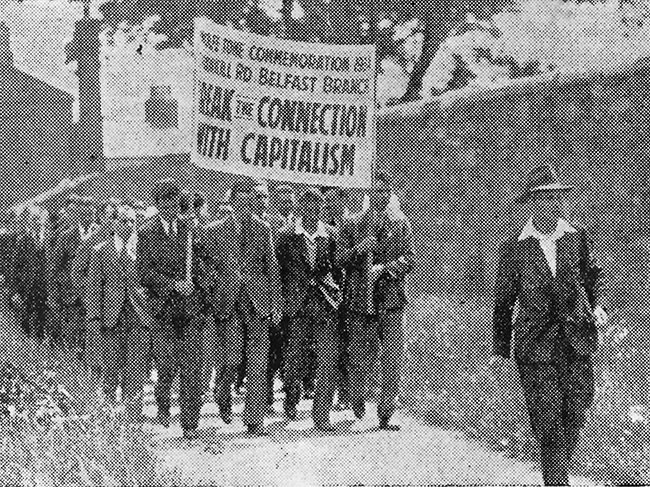Republicanism is the international revolutionary tradition that preaches a unifying vision by which we are all equal and sovereign citizens in a democratic secular republican state. In an Irish context, it is perhaps best summed up by Wolfe Tone’s famous declaration of his aims and means:
‘’To subvert the tyranny of our execrable government, to break the connection with England, the never-failing source of all our political evils, and to assert the independence of my country—these were my objects. To unite the whole people of Ireland, to abolish the memory of all past dissentions, and to substitute the common name of Irishman in the place of the denominations of Protestant, Catholic and Dissenter—these were my means.‘’
The republican tradition, both internationally and in Ireland, forms a key part of the socialist ideal, and at a time when those who seek to spread hate and division are on the rise, it offers us a unifying vision of humanity, a vision that stands in opposition to both liberalism and right-wing nationalism.
Republicanism stresses our common humanity; it is inherently secular, and anti-sectarian, it is internationalist. It is therefore unsurprising that socialism evolved out of the radical republican tradition internationally. In Ireland, our most radical republicans have always recognised the centrality and importance of the masses as agents for social change, from Tone to Connolly to Liam Mellows.
For the Irish left to abandon republicanism, would be not merely to forget the struggles of Tone, Connolly, Mellowes, and so many others; but to forgo the republican ideal of a common humanity which forms the very basis of working class politics and socialism. By merging the republican ideal with the struggle for socialism, we enrich both and give ourselves a firm foundation for establishing working class political unity – a prerequisite for building a mass workers’ party that can fight for a 32 county socialist republic.
We live on an island that is divided in two by the legacy of colonial conquest. As a result of Brexit and other neoliberal factors the idea of a united Ireland is now firmly back on the political agenda.
But in approaching this, we must remember that Ireland is not merely divided geographically between two states, but that our working class communities in the north of Ireland are also partitioned by a bitter sectarianism.
Republicanism, in its true form, is an anti-sectarian ideology; one that views all as equal citizens regardless of religious affiliation or identity. Tone’s inspiring republican vision of unity is yet to be fulfilled. As socialist republicans, it is vital that we struggle, in the spirit of Tone, to forge a shared and common citizenship that can help to end both sectarianism and the partition of our island.
Republicanism cannot – by its very nature – be insular. It would be wrong to counterpose it to the possibility of a common future with other European countries or with countries further abroad. Indeed, one major struggle we have in common with all working people in Europe is the democratic republican struggle against the neo-liberal diktats of elements within the unaccountable, unelected EU bureaucracy.
And while Irish republicanism is a tradition of separatism from colonial and imperial domination, it is most certainly also internationalist, as a cursory glance at its past traditions will show.
Tone was inspired by the ideas of Tom Paine, and of the French Revolution, and he sought aid from the latter in his struggle to break the connection.
The Fenian Proclamation of 1867 declared boldly: “Republicans of the entire world, our cause is your cause. Our enemy is your enemy. Let your hearts be with us. As for you, workmen of England, it is not only your hearts we wish, but your arms.”
And, as The Workers’ Party’s predecessors in the Official Republican Movement embraced class politics in the 1960s and 70s, they, too, were inspired by the revolutionary struggles and victories in Russia, Cuba and Vietnam, and allied themselves with the international communist movement and the socialist countries.
In our own era, socialist republicans must appreciate the international nature of our struggle in the context of a world of globalised capital, US imperial dominance, and institutionalised EU neoliberalism.
Republicans who fail to embrace class politics will end up as just another version of Fianna Fáil and Fine Gael, another shade of green capitalism, implementing austerity, privatising public land, cutting corporation tax.
Socialists who fail to embrace republicanism are reduced to platitudes with no clear vision of the type of state they seek to create.
Instead, socialists need an inspiring vision of a different future; a vision of revolutionary change in a 32 county democratic socialist republic. We must offer a vision of an entirely different society wherein the republican ideal of our common humanity is made real by the defeat of the rule of capital; that republic is the only society that will be able to provide public housing, jobs for all, to tackle the climate crisis – to provide a decent life for all.
In the words of James Connolly:
‘’We, as socialist republicans, adopt in each case the more logical course and bend our energies to the abolition of that principle of evil, whose influence our moderate friends would seek only to minimise. A socialist republic is the application to agriculture and industry; to the farm, the field, the workshop, of the democratic principle of the republican ideal.’’
–
This article is based on the speech at a debate at the College Historical Society, Trinity College Dublin.





